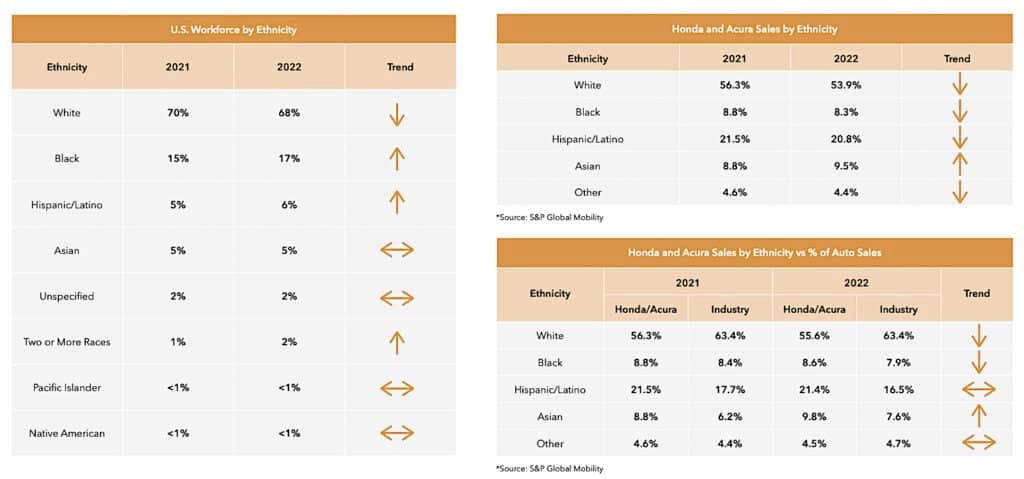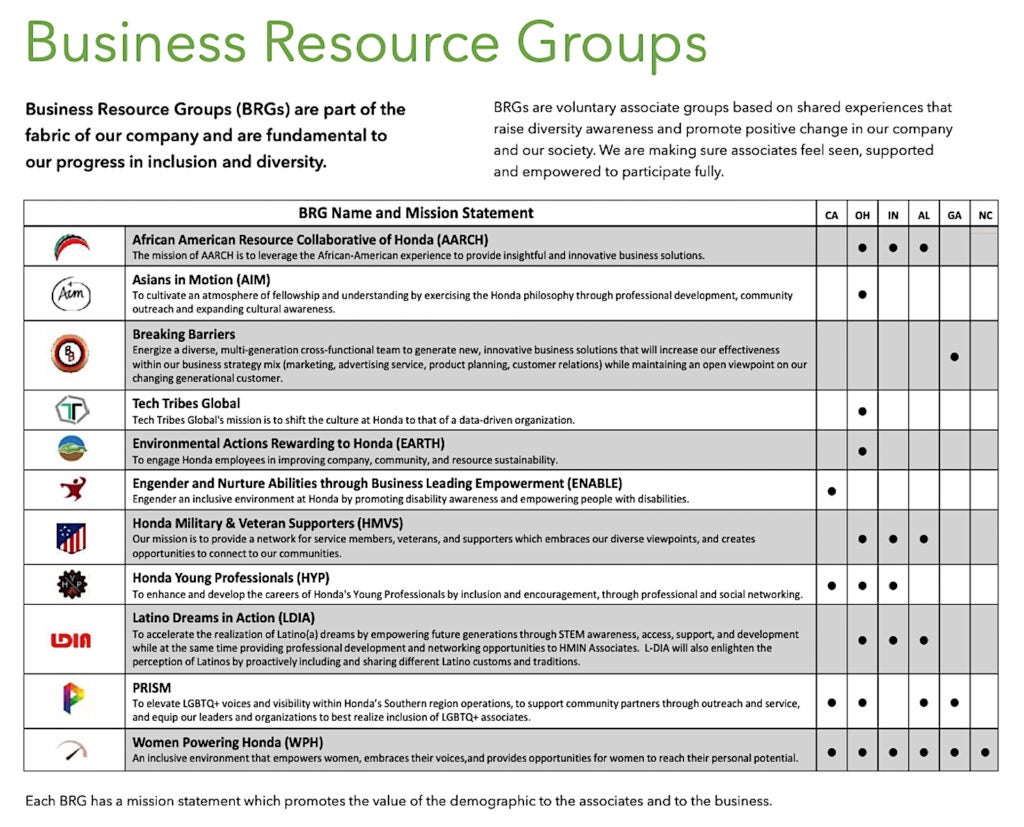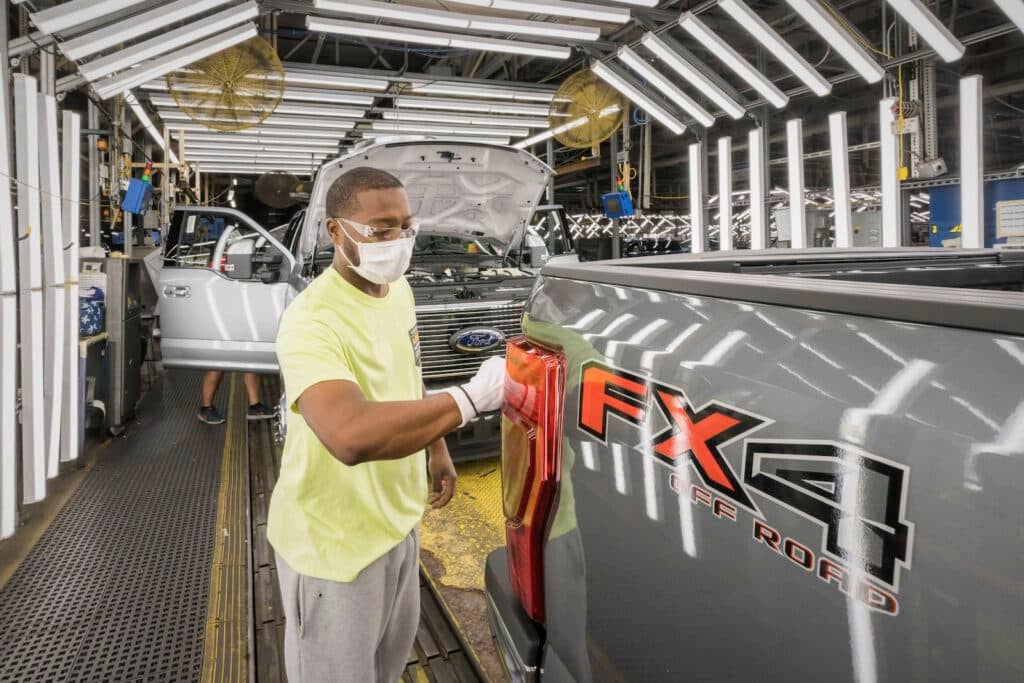American Honda issued its second annual Inclusion & Diversity report Tuesday. As anyone might expect, the report details efforts made to ensure the Honda workforce in California and Ohio reflects the ethnic and gender diversity of the American people.

Honda reports diversity is up by 2% among the full workforce and 3% in management positions. The report also extends to dealership diversity efforts, and it includes support for charitable organizations including the Hispanic Scholarship Fund, National Urban League, and Thurgood Marshall Scholarship Fund. Each of those organizations received $1 million from American Honda.
“The second annual Inclusion & Diversity report illustrates our unwavering commitment to fostering a diverse and inclusive environment and our ongoing dedication toward progress and growth as an organization,” stated Yvette Hunsicker, vice president of Corporate Social Responsibility and Inclusion & Diversity at American Honda Motor Co. Inc. “By supporting inclusion and diversity initiatives that promote equity within our company and in the communities where our associates live and work, we can bring the future.”
Industry-wide effort
Honda is hardly alone among automakers touting their diversity credentials. Ford is especially proud of its fifth year of recognition by the 2023 Bloomberg Gender-Equality Index for corporate progress on gender diversity and inclusion in the workplace. The index tracks policy development, representation, pay equity, culture and transparency.

“Our commitment to DEI makes our company stronger, helping us attract the best talent, compete, and win in an era of tremendous transformation,” said Jim Farley, Ford president and CEO.
GM boasts its recognition among the top 50 corporations in a report called Diversity Inc. The report is a product of Fair360. The report is based on a free survey that the corporations take to self-report on six facets of workplace fairness, including management and workforce diversity, executive accountability, talent sponsorship, workplace practices, supplier diversity, and philanthropy. On the top 50 list, Toyota is No. 4, Stellantis ranks No. 30, GM is at No. 33, and American Honda is No. 48.
“Diversity and inclusion speaks to the heart of the Toyota Way and respect for people,” says Ted Ogawa, president and chief executive officer, Toyota Motor North America. “D+I is good for business.”
Reports issued by the automakers are typically made for public — or at least shareholder — consumption, and they’re heavy on feel-good stories. Independent analysis is harder to find.
More independent analysis

The view from outside the corporations is not always so rosy about their diversity efforts. The Rainbow PUSH/Citizenship Education Fund (CEF) Automotive Project’s annual Automotive Diversity Scorecard issued last November is far from green across the board. However, for the first time during the decade that the annual scorecard’s been issued, no automakers received a red grade.
A red grade is essentially a failure, meaning an automaker’s diversity “initiatives and investments were non-existent, not disclosed, or did not provide enough relevant information for scoring” according to the report’s rubric.
In addition to red, an automaker can receive a yellow grade, which indicates some evidence of ethnic diversity is visible. Green indicates that a given company is demonstrating best practices for ethnic diversity, comprising stated goals, initiatives, and dollar investments, together with accountability and growth.
“We have seen many automakers take big steps forward with their diversity programs as they have come to truly see the value of diversity and inclusion programs,” said Rev. Jesse L. Jackson, founder and president of Rainbow PUSH Coalition, in a statemen.
However, this scorecard is still based on a self-evaluation by automobile manufacturers’ leadership teams to rate their companies’ diversity efforts. The survey reflects the most visible indicators of an OEM’s commitment to diversity.
In the 2022 report, GM and Toyota both received green grades in five areas and a single yellow grade in the sixth. GM earned its yellow grade in employment efforts, while Toyota’s was in the dealer network. However, GM and Toyota scored the highest among the 12 automakers surveyed this year, while BMW, Mercedes-Benz, and Volkswagen scored the lowest.

Women see results differently than men
The auditing, consulting and analysis firm Deloitte together with Automotive News commissioned a five-year study about women’s participation in the automotive industry. They noted while women make up about 50% of the national workforce, their representation in the automobile industry is about half that rate, and just 18% at dealerships. The study asked men and women working at OEMs, suppliers, dealers and captive finance companies to gauge the progress of women in the automotive industry, and the results were striking.
Between 2015 and 2020, the number of women who reported significant or some positive change in the industry dropped from 64% to 39%, while 64% of men in 2020 reported positive change. The percentage of women who said things were about the same rose from 21% to 26%, with 23% of men reporting status quo. Finally, the percentage of women reporting little change or things getting worse rose from 15% to 35%, while just 13% of men felt things were getting worse for their female co-workers.
“Nearly half of women surveyed said they would move to a different industry if they were to start their career today, with a lack of diversity, equity, and inclusion among the top three reasons to leave,” according to the Deloitte report. The top destinations according to the report would be health care and the high-tech industry.
Notably, 70% of women in the automotive industry also reported that they believe racial minorities are also underrepresented among their company’s senior executives, compared to just 40% of men who agreed. You can read the entire study results for yourself, but it seems clear that the picture is different when rank & file employees are asked about diversity efforts, compared a company’s self-reporting.
- SEO Powered Content & PR Distribution. Get Amplified Today.
- EVM Finance. Unified Interface for Decentralized Finance. Access Here.
- Quantum Media Group. IR/PR Amplified. Access Here.
- PlatoAiStream. Web3 Data Intelligence. Knowledge Amplified. Access Here.
- Source: https://www.thedetroitbureau.com/2023/06/automakers-prioritizing-diversity-equity-and-inclusion/
- :has
- :is
- :not
- :where
- $1 million
- $UP
- 12
- 15%
- 2%
- 2015
- 2020
- 2022
- 2023
- 30
- 35%
- 50
- a
- About
- According
- accountability
- across
- addition
- alone
- also
- always
- america
- American
- among
- an
- analysis
- and
- annual
- anyone
- ARE
- areas
- AS
- At
- attract
- auditing
- automakers
- automobile
- automotive
- automotive industry
- based
- BE
- been
- believe
- BEST
- best practices
- Big
- Bloomberg
- BMW
- board
- boasts
- both
- bring
- Bureau
- business
- but
- by
- california
- called
- CAN
- care
- Career
- ceo
- change
- chief
- chief executive officer
- clear
- CO
- come
- commitment
- Communities
- Companies
- company
- Company’s
- compared
- compete
- comprising
- consulting
- consumption
- Corporate
- Corporate Social Responsibility
- Corporations
- Credentials
- Culture
- dealer
- decade
- dedication
- dei
- deloitte
- demonstrating
- destinations
- details
- Development
- DID
- different
- diverse
- Diversity
- Diversity and inclusion
- Dollar
- dropped
- during
- each
- earned
- Education
- efforts
- employees
- employment
- enough
- ensure
- Entire
- Environment
- equity
- Era
- especially
- essentially
- Ether (ETH)
- evidence
- executive
- Executive Officer
- executives
- expect
- extends
- facets
- Failure
- fairness
- far
- female
- File
- Finally
- finance
- Find
- Firm
- First
- first time
- five
- For
- Ford
- Forward
- fostering
- founder
- Free
- from
- full
- fund
- future
- Gender
- getting
- given
- GM
- Goals
- good
- grade
- Green
- Growth
- Half
- Have
- Health
- Health Care
- Heart
- heavy
- helping
- highest
- However
- HTML
- HTTPS
- if
- illustrates
- in
- Inc.
- includes
- Including
- inclusion
- Inclusive
- independent
- index
- indicates
- Indicators
- industry
- information
- initiatives
- Investments
- Issued
- IT
- ITS
- Jackson
- Jim
- jpg
- just
- Kentucky
- Lack
- Last
- Leadership
- League
- least
- Leave
- Level
- Line
- little
- live
- lowest
- made
- make
- MAKES
- management
- many
- max-width
- meaning
- Men
- might
- million
- minorities
- most
- Motor
- move
- National
- network
- news
- no
- North
- north america
- noted
- number
- of
- Officer
- Ohio
- on
- ongoing
- or
- organization
- organizations
- our
- Our Company
- outside
- participation
- Pay
- People
- percentage
- PHILANTHROPY
- picture
- plato
- Plato Data Intelligence
- PlatoData
- policy
- positions
- positive
- practices
- president
- prioritizing
- Programs
- Progress
- projects
- promote
- proud
- provide
- public
- Push
- ranks
- Rate
- reasons
- receive
- received
- recognition
- Red
- reflects
- relevant
- report
- Report 2023
- Reported
- Reporting
- Reports
- representation
- respect
- responsibility
- Results
- Rise
- ROSE
- Rosy
- Said
- same
- says
- scorecard
- Second
- see
- seems
- seen
- senior
- shareholder
- showed
- significant
- single
- SIX
- sixth
- So
- Social
- some
- Speaks
- sponsorship
- start
- stated
- stats
- Status
- Steps
- Steps forward
- Still
- Stories
- stronger
- Study
- suppliers
- support
- Supporting
- Survey
- surveyed
- Take
- Talent
- teams
- Ted
- than
- that
- The
- The Future
- their
- they
- things
- this
- this year
- those
- three
- time
- to
- today
- together
- top
- toward
- toyota
- Transformation
- Transparency
- tremendous
- truck
- truly
- Tuesday
- typically
- underrepresented
- unwavering
- urban
- us
- value
- Vice President
- View
- visible
- volkswagen
- was
- Way..
- we
- were
- when
- which
- while
- WHO
- win
- with
- within
- Women
- Work
- Workforce
- working
- Workplace
- worse
- would
- year
- years
- yellow
- you
- zephyrnet












